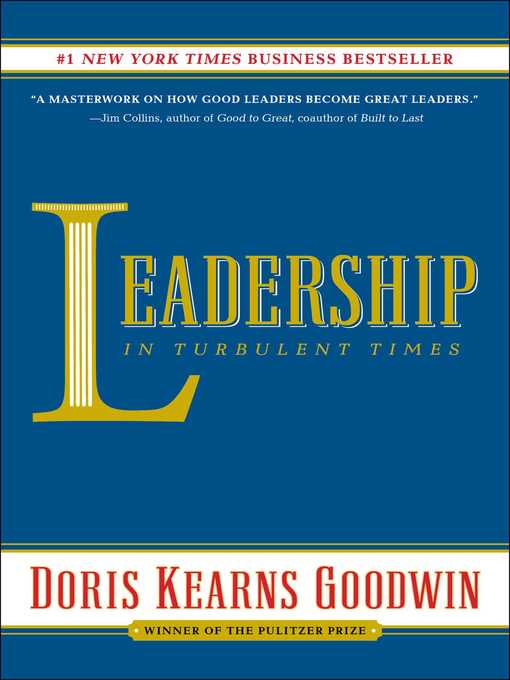
Leadership
In Turbulent Times
فرمت کتاب
ebook
تاریخ انتشار
2018
نویسنده
Doris Kearns Goodwinناشر
Simon & Schusterشابک
9781476795942
کتاب های مرتبط
- اطلاعات
- نقد و بررسی
- دیدگاه کاربران
نقد و بررسی

January 30, 1990
Unlike most leadership how-tos, this one by New York Times columnist Safire and his brother (co-anthologists of Words of Wisdom and Good Advice ) bypasses conventional tricks of the trade and so-called secrets of success in favor of aphorisms. Many may seem only peripherally related to leadership, but are amusing all the same. From A (Action) to Z (Zero-Sum Game), these kernels of wisdom comprise a provocative sampling of the know-how of past and present intellectual giants and lesser mortals: Virgil, Confucius, Einstein and Churchill hobnob with Joan Rivers and Sam Snead. Major ad/promo.

April 15, 2018
The Pulitzer Prize-winning Goodwin has spent five decades studying presidential history, so you can bet she can offer insight into what makes a good leader, especially in the worst of times. Studying Abraham Lincoln, Theodore Roosevelt, Franklin D. Roosevelt, and Lyndon B. Johnson (in the area of civil rights), she finds no common paths but common traits: ambition, resilience, and moral purpose.
Copyright 2018 Library Journal, LLC Used with permission.

Starred review from July 30, 2018
Goodwin (Team of Rivals) further burnishes her credentials as a popular historian with this thoughtful revisiting of the lives of four presidents to whom she has previously dedicated individual books—Abraham Lincoln, Theodore Roosevelt, Franklin D. Roosevelt, and Lyndon Johnson—with the aim of obtaining answers to eternal questions about leadership, including what life experiences contribute to it and whether “the times make the leader” or vice versa. She toggles back and forth between her subjects in sections that trace their upbringings and ambitions, the adversities that tested them (such as personal tragedies and crippling illness), and their approach to the major challenges that confronted them as presidents. She notes commonalities—each of the four was determined to outwork political opponents—as well as differences, for example contrasting Lincoln’s impoverished childhood with the privileged upbringing both Roosevelts had. The meat of the book is four chapters, one for each subject, about important episodes in their presidencies, with headings naming elements of their leadership styles (“Acknowledge when failed policies demand a change in direction”; “Don’t hit unless you have to, but when you hit, hit hard”). Goodwin does not shy from criticism, especially of Johnson, whom she worked for in the White House and helped with his memoirs; she writes that he stumbled badly on Vietnam. But overall the tone is inspirational, setting forth examples of how to do leadership right.

August 15, 2018
With impeccable timing, the acclaimed historian focuses on the ways four presidents navigated the country through wrenching clashes and crises.Pulitzer Prize winner Goodwin (The Bully Pulpit: Theodore Roosevelt, William Howard Taft, and the Golden Age of Journalism, 2013, etc.) profiles Abraham Lincoln, Theodore Roosevelt, Franklin Roosevelt, and Lyndon Johnson, all of whom she's written about previously. Lincoln's "unmatched work ethic, rhetorical abilities, equable nature, and elevated ambition" steered him to the moment in 1862 when he gathered his Cabinet for the first draft of the Emancipation Proclamation. That document, writes the author, is "remarkable for its flat precision," revealing Lincoln's wisdom in reining in rhetorical flourishes "to reach across factions" and avoid moral condemnation of slaveholding states. Goodwin admires Theodore Roosevelt for his ability to change himself from a "nervous, unhealthy, fragile child" to a leader who, through the force of his personality and adept use of the press, protected working-class Americans from vast wealth inequality. Franklin Roosevelt's amiable confidence and ability to lead by example pushed the country through the Great Depression, while Johnson's mastery of legislative strategy eventually compelled many national politicians to see that civil rights were long overdue. The most remarkable aspects of this book are the astute psychological portraits of these leaders: comprehensive, human, and engaging, clearly the results of long study. In the final chapters, Goodwin uses short signposts, snippets of advice, to guide readers. For example, in the section about Johnson's seemingly insurmountable passage of the Civil Rights Act of 1964, she writes, "make a dramatic start" and "establish the most effective order of battle," and then follows that line with several paragraphs about why Johnson fought to pass a tax cut before attempting the more momentous civil rights bill. These demarcations clarify the labyrinthine political and cultural issues the presidents confronted.In intimate, knowing ways, Goodwin crafts history as aspiration--or at least inspiration--for readers; let's hope a hefty portion of those readers have titles that begin with Sen. or Rep.
COPYRIGHT(2018) Kirkus Reviews, ALL RIGHTS RESERVED.

August 1, 2018
In our own turbulent times, presidential leadership?its qualities, requirements, and outcomes?has become an important concern. While presidential historian Goodwin (The Bully Pulpit, 2013) does not address the present situation in this beautifully written meditation on the topic, her assessment of four respected presidents' abilities as leaders cannot help but contribute to current debates. Goodwin considers Lincoln, both Roosevelts, and Lyndon Johnson, all subjects of her previous work, in a three-part inquiry that begins with discussion of each president's formative experiences and early public life, moves to a life-altering crisis for each man and its impact on his trajectory, and, finally, focuses on an episode during that man's time in office that illustrates his particular approach to leadership under difficult conditions. Goodwin offers no single template for presidential leadership, concluding that the successes of these men reflected unique convergences of the individual, his context, and the crisis at hand. She does, however, identify common and essential characteristics among her legendary subjects: responsiveness to human needs, willingness to evolve, and a wish to be remembered for their achievements. Pulitzer- and Carnegie Medal-winning historian Goodwin draws on 50 years of scholarship in this strong and resonant addition to the literature of the presidency.(Reprinted with permission of Booklist, copyright 2018, American Library Association.)

























دیدگاه کاربران